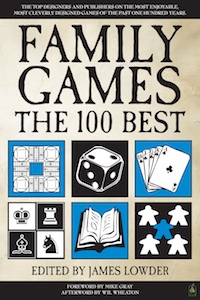 Hey folks, FAMILY GAMES: THE 100 BEST just left the printer and I’m pleased to share with you the full list of authors, games and essays. The game that I talked about was GLOOM, which is one of my favorite card games. How many of these games have you played or can recognize?
Hey folks, FAMILY GAMES: THE 100 BEST just left the printer and I’m pleased to share with you the full list of authors, games and essays. The game that I talked about was GLOOM, which is one of my favorite card games. How many of these games have you played or can recognize?
- Foreword by Mike Gray
Introduction by James Lowder
Afterword by Wil Wheaton
Appendix A: Games and Education by David Millians
Appendix B: Family Games in Hobby Games: The 100 Best by James Lowder
List of Family Games and Essayists
- Carrie Bebris on 10 Days in the USA
Steven E. Schend on 1960: The Making of the President
Dominic Crapuchettes on Apples to Apples
Mike Breault on The Awful Green Things from Outer Space
Jeff Tidball on Balderdash
Keith Baker on Bang!
Bruce Harlick on Battleship
James Wallis on Bausack
Paul Jaquays on Black Box
Lewis Pulsipher on Blokus
Teeuwynn Woodruff on Boggle
Fred Hicks on Buffy the Vampire Slayer
James Ernest on Candy Land
Ian Livingstone on Can’t Stop
Bruce Whitehill on Careers
Jared Sorensen on Cat
Wolfgang Baur on Cathedral
John Scott Tynes on Clue
Alessio Cavatore on Condottiere
Elaine Cunningham on Connect Four
Will Hindmarch on Cranium
Erik Mona on Crossbows and Catapults
William W. Connors on Dark Tower
John D. Rateliff on Dogfight
Robert J. Schwalb on Dungeon!
jim pinto on Dvonn
Gav Thorpe on Easter Island
Jeff Grubb on Eurorails
Kenneth Hite on Faery’s Tale Deluxe
Richard Dansky on Family Business
Warren Spector on Focus
Corey Konieczka on For Sale
James M. Ward on Fortress America
Stan! on Frank’s Zoo
Bruce C. Shelley on The Game of Life
Phil Orbanes on A Gamut of Games
Monica Valentinelli on Gloom
Matt Leacock on Go Away Monster!
Steve Jackson on The Great Dalmuti
David “Zeb” Cook on Guillotine
Jason Matthews on Gulo Gulo
Joshua Howard on Halli Galli
Bruce Nesmith on Hare & Tortoise
Mike Pondsmith on HeroClix
Anthony J. Gallela on HeroQuest
Chris Pramas on HeroScape
Ed Greenwood on Hey! That’s My Fish!
Colin McComb on Hive
Alan R. Moon on Hoity Toity
Jon Leitheusser on Ingenious
Uli Blennemann on Java
Luke Crane on Jungle Speed
Monte Cook on Kill Doctor Lucky
Emiliano Sciarra on Knightmare Chess
Todd A. Breitenstein on Liar’s Dice
Marc Gascoigne on Loopin’ Louie
Andrew Parks on Lord of the Rings: The Confrontation
Seth Johnson on Lost Cities
John Yianni on Magi-Nation
Bill Bodden on Master Labyrinth
Andrew Greenberg on Mastermind
Ken Levine on Memoir ’44
Scott Haring on Mille Bornes
Steve Jackson on Monopoly
Sheri Graner Ray on Mouse Trap
Kevin G. Nunn on Mystery Rummy: Murders in the Rue Morgue
Dale Donovan on The Omega Virus
Darren Watts on Othello
Charles Ryan on Pandemic
Michelle Lyons on Pente
Thomas M. Reid on Pictionary
Nicole Lindroos on Pieces of Eight
John Wick on Pit
Matt Forbeck on Pokémon
Robin D. Laws on Prince Valiant
Stephen Glenn on Qwirkle
Sébastien Pauchon on Ricochet Robots
Peter Olotka on Risk
Richard Breese on Rummikub
Jesse Scoble on Scotland Yard
Richard Garfield on Scrabble
Mike Selinker on Set
Rob Heinsoo on Small World
Hal Mangold on Sorry!
Jess Lebow on Stratego
Eric Goldberg on Strat-O-Matic Baseball
Andrea Angiolino on Survive!
Karl Deckard on Thebes
Dan Tibbles on Time’s Up!
Tom Wham on Trade Winds
Susan McKinley Ross on TransAmerica
Ray Winninger on Trivial Pursuit
Leo Colovini on Twixt
Matthew Kirby on Uno
David Parlett on Upwords
Lester Smith on Werewolf
John Kovalic on Wits & Wagers
Philip Reed on Yahtzee
Kevin Wilson on Zendo
Jess Hartley on Zooloretto

 I belong to several writing and networking groups all around the web, and sometimes there are events posted that are just “that cool.” This summer event is so in touch and up-to-date with our current culture, it’s definitely worth checking out and is perfect for young women interested in this multi-million dollar industry.
I belong to several writing and networking groups all around the web, and sometimes there are events posted that are just “that cool.” This summer event is so in touch and up-to-date with our current culture, it’s definitely worth checking out and is perfect for young women interested in this multi-million dollar industry.